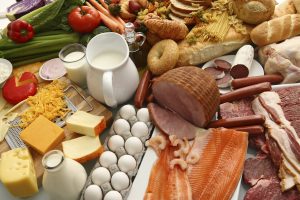![What-Say-Pregnant-Women[1]](https://howfacecare.com/wp-content/uploads/2017/12/What-Say-Pregnant-Women1-300x200.jpg) Pregnancy is the most beautiful period in a life of each woman. However, it doesn’t mean that there are no problems at all as pregnancy should be taken seriously. You should forget about all bad habits and do everything to give a birth to a healthy child.
Pregnancy is the most beautiful period in a life of each woman. However, it doesn’t mean that there are no problems at all as pregnancy should be taken seriously. You should forget about all bad habits and do everything to give a birth to a healthy child.
Pregnancy brings a lot of happiness as well as worries. The most important concern is the weight gain. Sure, that nobody wants to become plump but what to do if a large supply of nutrients is required to maintain a life of your baby. However, if you follow the recommendations of dietologists you will be able to enjoy food and not become fat because of overeating. Remember that your healthy way of life during 9 months is a contribution to your child’s health. That’s why you are offered to look at the useful tips how to change your eating habits so that both mom and the kid feel fine.
Contents
- Tip number 1: Don’t change your eating habits much during first 3 months
- Tip number 2: Avoid eating salty food during the second trimester
- Tip number 3: Try to stick to the correct eating regimen
- Tip number 4: Don’t forget about vitamins and microelements
- Tip number 5: Eat foods rich in fiber
- Tip number 6: Store products in the right way to avoid food poisoning
- 10 Strictly Forbidden Things for Pregnant Women
- Video
Tip number 1: Don’t change your eating habits much during first 3 months
 In the first months of pregnancy, it is not recommended to change your eating habits drastically, especially since it is very difficult to cope with all kinds of “eccentricities” when choosing food at this stage. Therefore, if you, like before, want a fried potato, eat without a twinge of conscience.
In the first months of pregnancy, it is not recommended to change your eating habits drastically, especially since it is very difficult to cope with all kinds of “eccentricities” when choosing food at this stage. Therefore, if you, like before, want a fried potato, eat without a twinge of conscience.
By the way, a few words about “eccentricities” when choosing food. Experts believe that in this way the woman’s body signals the lack of certain substances: for example, interest in dairy products indicates a lack of calcium in the body, and if a woman suddenly wants sea kale, the body needs iodine.
- Fresh vegetables and fruits, potatoes and pickled cucumbers will become a source of vitamin C;
- nuts, peas, fish – vitamin B1;
- bananas – vitamin B6;
- potassium, orange and red vegetables and fruits are rich in vitamin A (carotene).
It happens that at the very beginning of pregnancy the future mothers refuse obviously useful products, for example meat, because they simply cannot tolerate it. These changes are associated with early toxicosis and usually pass with time.
Important: Do not force yourself to eat foods that cause a feeling of nausea. It is possible to consult a doctor and get protein vitamin-mineral complexes that will help to cope with a deficiency of nutrients.
They will supply you with a guaranteed number of vitamins, calories, proteins and will eliminate the need to cook.
Back
Tip number 2: Avoid eating salty food during the second trimester
![nintchdbpict000272617853[1]](https://howfacecare.com/wp-content/uploads/2017/12/nintchdbpict0002726178531-300x214.jpg) Starting from the second half of pregnancy, you will have to choose what you eat as there are more restrictions due to the fact that the gastrointestinal tract of a pregnant woman begins to work in overload mode: heartburn and constipation may appear.
Starting from the second half of pregnancy, you will have to choose what you eat as there are more restrictions due to the fact that the gastrointestinal tract of a pregnant woman begins to work in overload mode: heartburn and constipation may appear.
There are several things to keep in mind:
- Stewed, baked food or steamed food helps cope with these problems. By the way, all fried food causes thirst, and you need to remember that during pregnancy, excess fluid can cause the appearance of swelling. That’s why try not to drink too much.
- For the same reason, stay away from salty foods. Sour food as usual (and preferably iodized salt), but exclude from the menu pickles, salted fish and smoked meat. The problem is that a large amount of salt causes thirst, and too much fluid increases the risk of edema.
- In the last two months of pregnancy, doctors recommend that future mothers do not salt food and do not drink more than 1-1.2 liters of fluid per day. At the same time, do not completely abandon the salt, it can cause dehydration.
- From the first days of pregnancy, try to drink coffee, in the composition of which there is no caffeine: this way you reduce the burden on your body and you do not have to wean from your favorite taste. This transition will help you avoid many problems: the exciting action of coffee can activate the smooth muscles of the uterus, where the baby is developing, and cause a threat of abortion.
Important: Those women who worry about their figure should remember that the usual lightweight products should be replaced with products of the standard fat content, and to vegetables and fruits add meat, fish, cereals, bread.
Back
Tip number 3: Try to stick to the correct eating regimen
![vegetables-grains-fish-TS-177348037[1]](https://howfacecare.com/wp-content/uploads/2017/12/vegetables-grains-fish-TS-1773480371-300x199.jpeg) During pregnancy in the body, as in the life of the future mother, there are many changes. How psychologically women prepare for the appearance of the baby, so
During pregnancy in the body, as in the life of the future mother, there are many changes. How psychologically women prepare for the appearance of the baby, so
the body starts restructuring to ensure the correct development of the fetus from the first days. During this period, the load on all organs and systems of the future mother is significantly increased. However, this is not surprising, because the whole body works to preserve the life that has arisen and provide the baby with proper development, nutrition, comfort and warmth. In order to be healthy and feel good, any pregnant woman should have a certain regimen. Here you will find several tips how to organize your eating habits:
- To feel good, try to eat every 4 hours.
- Start the day with a full breakfast (a dairy dish, a bit of whole-grain bread or muesli and fresh fruit).
- Have a real dinner (if you don’t have time or can’t cook, eat a sandwich with fresh vegetables and fruits or a salad dressed with soy or corn oil, yogurt and some fruit).
- Have a light supper (the fourth meal should be dietary: a dairy dish, some fruit, some black bread or unsweetened cookies).
Between breakfast and lunch and during a snack, you can have a light meal with fruit, a low-fat sandwich, yogurt and drink juice.
Important: Remember that it is better to forget about the buns and puff pastries, pizza, sausage, sausages, fatty and fried foods.
Back
Tip number 4: Don’t forget about vitamins and microelements
![vitamins1[1]](https://howfacecare.com/wp-content/uploads/2017/11/vitamins11-300x199.jpg) Vitamins, as well as mineral substances, especially calcium and phosphorus, are of great importance for the proper development of pregnancy. Let us consider them in more detail.
Vitamins, as well as mineral substances, especially calcium and phosphorus, are of great importance for the proper development of pregnancy. Let us consider them in more detail.
- Vitamin E is vital for a future mother for the normal functioning of the reproductive system and intrauterine development of the fetus. Vitamin E is found mainly in plant foods, as well as in egg yolks, liver, milk. This vitamin is found in sprouted wheat grains, unrefined vegetable oils (sunflower, olive), avocados, mangoes, peaches, sea-buckthorn, bran, spinach, broccoli, nuts, seeds, hips, dandelion, nettle.
- Vitamin D is very important for the proper formation of the child’s skeleton, healthy teeth. A good source of vitamin D are fatty fish – salmon, mackerel, sardines, as well as dairy products, cottage cheese, cheese, egg yolks. The main source of vitamin D is the sun, however, prolonged exposure to direct rays is harmful to health.
- B vitamins strengthen muscle fibers, which are necessary for the normal functioning of the nervous, digestive, cardiovascular systems. For example, vitamin B6 ensures the correct development of the brain and nervous system of the child, while a woman reduces the manifestation of toxicosis in the first half of pregnancy. In addition, vitamin B6 regulates the processes of inhibition in the nervous system, that is, reduces irritability and aggressiveness. To help the nervous system and reduce irritation, it is necessary to include beef, eggs, milk, green pepper, cabbage in your diet. Many B vitamins are found in dry food and brewer’s yeast, raw rice, flour, peas.
- It is necessary to distinguish separately folic acid (vitamin B9), which is extremely necessary for the normal development of the fetal nervous system, the growth and development of living tissues and organs, as well as for the process of creating all the blood elements. The source of such a useful vitamin is fresh fruits and vegetables (beans, beans, spinach, tomatoes, etc.) especially dark green leafy vegetables, as well as kidneys and liver of animals.
- Vitamin A is very important for the embryonic development of the baby, including the formation of the heart, lungs, kidneys, eyes, bones, as well as the circulatory, respiratory and central nervous systems. In addition, it protects cells from the effects of toxic products and harmful emissions. Vitamin A is especially necessary for women who are about to give birth, because it promotes postnatal tissue repair. To receive this useful vitamin, it is possible from beta-carotene which in a considerable quantity contains in vegetables and fruit of yellow, orange and red color. In the highest concentrations it is found in carrots, apricots, parsley leaves and spinach, pumpkin.
Microelements:
- Calcium, phosphorus and magnesium: these are the basic materials for the musculoskeletal system (bones and cartilage) of a child. With a lack of calcium during pregnancy, the fetus will take it from the bones and teeth of the mother, which can result in softening of the bones of a woman, their increased fragility and deformation. Milk and dairy products, cheese, nuts, green vegetables are the main sources of calcium. A large amount of phosphorus is found in fish, meat, eggs, uncooked grain. Magnesium is found in watermelons, cereals, nuts, vegetables.
- Potassium and sodium: For the regulation of the water-salt balance of the body, potassium and sodium are responsible. A large amount of potassium is found in the costume, spinach, peas, nuts, banana and mushrooms. Sodium is worth looking into legumes (beans, peas), as well as in cereals.
- Iron: Deficiency of iron causes a sharp decrease in the level of hemoglobin in the blood, which, in turn, can even lead to fetal hypoxia (oxygen starvation). Iron is better absorbed from red meat (veal, beef), red fish, poultry. There are foods that inhibit iron absorption – fats, soy protein, dairy products, tea, coffee. Therefore, it is undesirable to combine meat dishes with dairy products. A large amount of iron is found in beans and other legumes, as well as in cereals, nuts and greens.
Important: Try to include the mentioned foods rich in vitamins and microelements in your daily ration.
Back
Tip number 5: Eat foods rich in fiber
![cereal[1]](https://howfacecare.com/wp-content/uploads/2017/12/cereal1-300x200.jpg) Fiber is called gross fiber, which is contained in all products of plant origin. They are necessary for everyone without exception, since they help prevent the development of cardiovascular diseases and endocrine system diseases, and for pregnant women are especially valuable. Eating a sufficient amount of fiber allows you to:
Fiber is called gross fiber, which is contained in all products of plant origin. They are necessary for everyone without exception, since they help prevent the development of cardiovascular diseases and endocrine system diseases, and for pregnant women are especially valuable. Eating a sufficient amount of fiber allows you to:
- cope with constipation,
- ease nausea and heartburn,
- and not gain weight during pregnancy – fiber creates a feeling of satiety.
The list of foods rich in fiber includes:
- vegetables (in raw, cooked or stewed),
- fruits and dried fruits,
- berries,
- legumes,
- cereals.
Optimal diet is in which the fiber is present on the table during each meal. However, it is not necessary to go over to such a menu abruptly – bloating, which is almost inevitable with a sharp increase in the use of plant fibers, can discourage the desire to continue. The first step is a fiber-rich breakfast, for example, oatmeal, preferably from large flakes that have not been excessively processed. In a few days, when the digestive system gets used to such a breakfast, you can add stewed vegetables as a side dish at dinner or dinner with raisins with a handful of cottage cheese. Carrots or an apple with skin – a much healthier snack than a cookie or a sandwich.
Important: In pursuit of fiber, you can discover new combinations of products, for example, buckwheat porridge with avocado pulp, or brown rice with green bean stew.
Back
Tip number 6: Store products in the right way to avoid food poisoning
 Observing the simple rules of hygiene, you can protect yourself from food poisoning. In addition to general advice to store food in the refrigerator, wash vegetables and fruits, do not eat poorly fried or undercooked food, raw eggs, products with expired shelf life, there are several important and not too obvious recommendations.
Observing the simple rules of hygiene, you can protect yourself from food poisoning. In addition to general advice to store food in the refrigerator, wash vegetables and fruits, do not eat poorly fried or undercooked food, raw eggs, products with expired shelf life, there are several important and not too obvious recommendations.
- Give preference to cheeses based on pasteurized milk, hard or melted varieties. Crust with cheese is better cut.
- Do not buy groceries (by weight), prefer ready-made vacuum packs.
- Seafood, raw fish dishes can only be eaten if you are firmly convinced of their quality.
- At least once a week, have a general cleaning in the refrigerator.
- Meat and fish must necessarily be hot-worked, warmed up well, but do not boil already prepared dishes and store them in the refrigerator for no more than 24 hours.
- Do not drink raw milk: all dairy products must be pasteurized or sterilized.
- Eat foods from the liver no more often than once a week. Remember that the liver is a chemical laboratory for neutralizing harmful substances that have a property to accumulate in it.
- Frozen products are transported in an isothermal bag. Defreeze them in the refrigerator and never freeze again.
- Vegetables, meat and cooked dishes should be kept separately.
Important: If you need to cut a salad after cutting raw meat or fish, do not forget to wash your hands. For different products use different knives and cutting boards.
Back
10 Strictly Forbidden Things for Pregnant Women
![thinkstockphotos123904454_1.jpg.CROP.promo-xlarge2[1]](data:image/gif;base64,R0lGODlhAQABAIAAAAAAAP///yH5BAEAAAAALAAAAAABAAEAAAIBRAA7) Alcohol: The effect of alcohol on the fetus is well researched. Ethanol easily penetrates the placenta directly into the fetal blood, causing congenital malformations. Facial abnormalities, microcephaly (brain underdevelopment), physical underdevelopment, anomalies in the development of organs – this is what threatens the use of alcohol, especially in the first trimester.
Alcohol: The effect of alcohol on the fetus is well researched. Ethanol easily penetrates the placenta directly into the fetal blood, causing congenital malformations. Facial abnormalities, microcephaly (brain underdevelopment), physical underdevelopment, anomalies in the development of organs – this is what threatens the use of alcohol, especially in the first trimester.- Smoking: In cigarette smoke there is carbon monoxide, which reacts with hemoglobin and during gas exchange replaces part of the oxygen. As a result, both the mother and the fetus lack oxygen. Intrauterine hypoxia is fraught with developmental delay, problems with the cardiovascular system, reduced immunity. Smoking during pregnancy can provoke a detachment of the placenta, pregnancy fading and even premature birth. Nicotine can also affect the psyche of the unborn child.
- Coffee: It is believed that excess caffeine leads to overstrain of the cardiovascular system in the mother and fetus, causes a sense of anxiety and can even lead to miscarriage or premature birth.
- Medications: The instructions to the medication always indicate whether it is contraindicated for pregnant women. Otherwise, it is better to consult a doctor once again. Prohibited during pregnancy: vasoconstrictive drops in the nose, a number of antibiotics, etc.
- Medicinal herbs: Among a fairly large number of useful medicinal herbs, there are those that can provoke miscarriage, and those that have a negative effect on the fetus.
- Lifting weights: During pregnancy, avoid lifting heavy objects (no more than 2 kg). Such a rash movement can provoke a miscarriage. This is especially true with hypertension of the uterus.
- X-ray and fluorography: With X-ray irradiation, there is a risk of damage to the child’s nervous system. Therefore, this type of diagnosis is prohibited during pregnancy.
- Active sports: Strictly prohibited are sports such as weightlifting, equestrian sport, cycling and any other power and trauma dangerous. Preference is given to swimming, walking in the fresh air, gymnastics for pregnant women (yoga and pilates).
- Stress: If your work involves a busy schedule, frequent negotiations and active participation in large-scale projects, then think about how to avoid all this. The load at work should in no case be reflected on your nerves, or on health – your and your baby.
- Some products: Do not eat raw or insufficiently cooked eggs. Eggs should be carefully prepared, proteins and yolks – firm. This prevents the risk of infection with salmonella. You cannot drink raw (not pasteurized) milk, only one that has been thoroughly heat treated or pasteurized. Raw or poorly cooked meat is also prohibited during pregnancy. The same goes for sausage and minced meat. You should avoid moldy cheeses. They can contain listeria – bacteria that cause listeriosis. Even the mild form of this infectious disease during pregnancy can lead to miscarriage or severe illness in the newborn.
Back
![thinkstockphotos123904454_1.jpg.CROP.promo-xlarge2[1]](https://howfacecare.com/wp-content/uploads/2017/12/thinkstockphotos123904454_1.jpg.CROP_.promo-xlarge21-300x214.jpg) Alcohol: The effect of alcohol on the fetus is well researched. Ethanol easily penetrates the placenta directly into the fetal blood, causing congenital malformations. Facial abnormalities, microcephaly (brain underdevelopment), physical underdevelopment, anomalies in the development of organs – this is what threatens the use of alcohol, especially in the first trimester.
Alcohol: The effect of alcohol on the fetus is well researched. Ethanol easily penetrates the placenta directly into the fetal blood, causing congenital malformations. Facial abnormalities, microcephaly (brain underdevelopment), physical underdevelopment, anomalies in the development of organs – this is what threatens the use of alcohol, especially in the first trimester.




